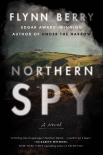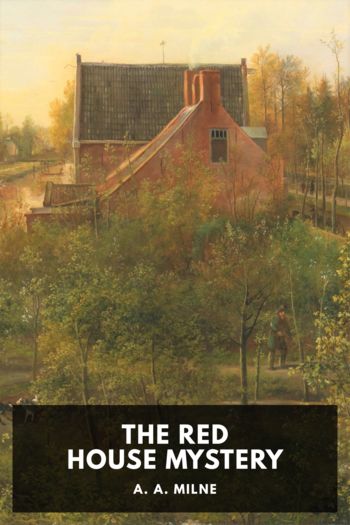Northern Spy Berry, Flynn (books for 9th graders .TXT) 📖

Book online «Northern Spy Berry, Flynn (books for 9th graders .TXT) 📖». Author Berry, Flynn
“Do you want to be placed together or separately?” asks the detective.
“Together,” we say at the same time.
42
It’s raining in Dalkey, on the cliffs and the railway line, the lighthouse and the harbor, the slate roofs and chimneys, and on the skylight above the table where Marian and I are having breakfast. The table itself is crowded with plates. Neither of us could decide, so we’re sharing the polenta, the crêpes, and a lemon danish, wedged onto the table along with a cafetière of coffee, milk, and cups. I cut up toast and set it on the high-chair tray. Finn nods to himself, studying the options, before lifting his first bite. Marian tips honey over her crêpe, I spread cherry jam on mine and then roll it up like a cigar. Around us, the other tables are full of people chatting. Marian finishes her half of the polenta, and we trade plates across the table.
The IRA thinks we’re dead. They think that we were in a locked room when the farmhouse exploded.
“More coffee?” asks Marian.
—
After leaving the café, I strap Finn into his carrier and we walk through the village. We’ve been settled in the republic, in a small village on the coast thirty minutes south of Dublin. The IRA has plenty of supporters in the republic, but what I’ve already noticed is how little people here concern themselves with events in the north. Their lives have carried on as usual, while across the border ours imploded. It would infuriate me, if it weren’t part of what will keep us safe here. Our other option for resettlement was a town in the southeast of England, and I couldn’t imagine my son speaking with an English accent one day.
We’ve been in Dalkey for a week now. We prepared a backstory for ourselves, but none of the locals seem particularly surprised that we’ve ended up here. They’re used to visitors deciding to stay.
Dalkey sits on a headland at the southern tip of Dublin Bay, with views across the water of the city, and the ferries leaving Dun Laoghaire. I find everything about Dalkey appealing, everything to scale—the curved main street, the train station, the church, the houses, the cedar elms and umbrella pines. I can’t tell if this is down to my near-death experience or the village itself.
“It will start to annoy you eventually,” says Marian.
“Probably,” I say cheerfully.
The police are providing us with housing for a year. Mine is a small new-build house on the village’s outskirts. You can’t tell that it’s owned by the police, used to lodge informers and protected witnesses. I wonder about the others who have stayed there before me, if they felt scared, or overwhelmed. It’s a lot of work, faking your own death. A lot of admin.
Every hour, I remember something else. The food in my fridge. The unreturned library books. The newspaper subscription. It would be easier for me to handle these tasks myself, but, the thing is, I’m supposed to be dead. So instead I have to call my mam, my next of kin, and she has to ring on my behalf, and try to explain to the customer-service representative that I’ve died, and that, no, she doesn’t have my account number. She spent a wearying afternoon yesterday trying to cancel my auto insurance.
“Sorry, mam,” I said, and she said, “Couldn’t you have left Tom as your next of kin? It would serve him right.”
On our first night across the border, I called Tom from the hospital. “I’m in the republic,” I said. “With the baby.”
“Oh. For work?”
“No. Do you want to sit down?”
When I finished explaining, there was a long silence. Then, in a cold voice, he said, “You shouldn’t have gotten involved. What were you thinking? How will I see my son?”
“It’s a short train from Belfast.”
“Fuck you, Tessa.”
Tom is going to be angry with me for a long, long time. Eventually, maybe, the trips here will start to seem normal. He will have Finn for longer stretches. Or, maybe, maybe, he and Briony will move to Dublin.
Our mam is planning to move nearby, maybe Bray. “Have you seen the house prices?” she said. “Absolutely shocking.”
She said that whenever she’s out in Andersonstown, and has to remember to look sad over supposedly losing her daughters, she thinks of the housing market in the republic.
In Dalkey, I walk with Marian and Finn down the main street and out to the promontory. From here, you can see the DART trains that run along the bay all the way to Howth.
“What are you going to do now?” I ask Marian.
“No idea.”
“Do you want to be a paramedic again?”
“No,” she says, “no, definitely not. What about you?”
“No idea.”
—
On the phone, Fenton asks me about the town, and I answer, feeling oddly nervous, like I want him to be impressed by how well we’re settling in.
“Are you scared, Tessa?” he asks.
“No.”
“It’s normal if you are.”
“I’m not.”
“You might be a bit numb at the moment,” he says.
But it’s the opposite. I feel keenly, achingly alive. When this conversation ends, I am going to walk with Finn around Dalkey, to look at the wreaths and the glowing trees inside the houses.
Fenton says, “Some people find coming back even more difficult than being in captivity. It can be more painful, in a way.”
I nod, thinking that he means people who were abducted for long periods of time. I’d only been held for about twenty-four hours. My recovery time will be shorter, I think. It might have already finished.
Fenton says, “I’m here to help, Tessa.”
But why would I need help? I have my son. I have my body, I have food, weather, a stack of books to read. I have my sister and my mother.
After our call, Finn naps





Comments (0)